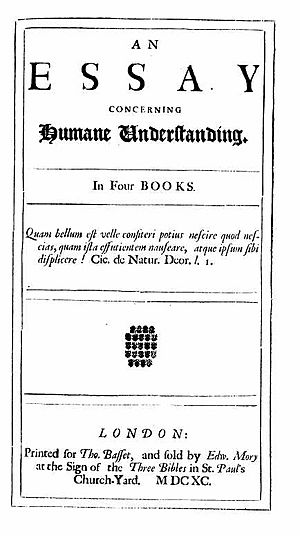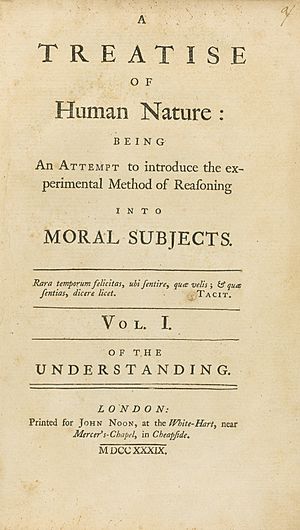Personal identity facts for kids
Personal identity is all about what makes you, you, over time. It's about figuring out what makes a person today the same person they were yesterday, last year, or even ten years ago.
In philosophy, the problem of personal identity asks big questions like: "What makes it true that a person now is the same as a person from the past?" or "What kind of things are we, as people?"
Philosophers often talk about two types of identity. The diachronic problem is about how a person stays the same over time. The synchronic problem looks at what makes a person who they are at one specific moment.
Contents
What Makes You, You?
Your Body Over Time
One idea is that you are the same person as long as your body continues to exist. But this can be tricky! Think about the Ship of Theseus problem: if you replace every part of a ship, is it still the same ship?
Our bodies are always changing. We grow, we age, and our cells are constantly being replaced. After many years, most of the matter in your body won't be the same as it was before. So, it's hard to say that your personal identity is just about your body staying exactly the same.
The teletransportation problem is a fun thought experiment. Imagine you could be "teleported" from Earth to Mars. A machine scans your body, sends the information, and rebuilds you on Mars. Is the person on Mars still you? This problem makes us think if having the exact same physical body is truly what makes you, you.
Your Mind or Soul
Another idea is that your mind or soul is what makes you the same person over time. Some people believe the mind is a special, non-physical part of you, separate from your body. If you are your mind, and your mind stays the same, then you stay the same person, even if your body changes.
The mind-body problem asks how your non-physical mind can connect with and control your physical body. For example, how do your thoughts or desires make your body move? Or how do things you see or hear create feelings in your mind? These are big questions philosophers have thought about for a long time.
Your Memories and Consciousness
Locke's Idea of Identity

The philosopher John Locke had a famous idea about personal identity. He believed that what makes you the same person over time is your consciousness – especially your memory. He said it's not about your body or even your soul.
Locke thought that you are the same person as long as you are aware of your past thoughts and actions, just like you are aware of your present ones. If you can remember doing something, then that action belongs to you.
He used an example: Imagine someone claims to be the reincarnation of Plato (an ancient Greek philosopher). Even if they had Plato's soul, Locke would say they are only the same person as Plato if they had Plato's memories and consciousness.
Locke also argued that your identity isn't based on your body. Your body changes as you grow, but you are still the same person. He said that animals stay the same because their life continues, even as their bodies change. For humans, it's our consciousness that keeps us the same.
This idea leads to an interesting thought: Since only you know your own consciousness, how can others truly know if they are judging the same person? Locke suggested that we can only judge people for actions they were conscious of. This idea is even part of the insanity defense in law, where someone might not be held responsible for actions if they were unconscious of them.
Locke said:
personal identity consists [not in the identity of substance] but in the identity of consciousness, wherein if Socrates and the present mayor of Queenborough agree, they are the same person: if the same Socrates waking and sleeping do not partake of the same consciousness, Socrates waking and sleeping is not the same person. And to punish Socrates waking for what sleeping Socrates thought, and waking Socrates was never conscious of, would be no more right, than to punish one twin for what his brother-twin did, whereof he knew nothing, because their outsides were so like, that they could not be distinguished; for such twins have been seen.
So, for Locke, your personal identity is not in your body or soul, but in your "same continued consciousness."
Psychological Continuity
In psychology, personal continuity means the unbroken connection of your private life and personality. It's about how your self-awareness, feelings, and understanding of the world stay consistent from one moment to the next.
This continuity is a big part of your identity. It helps you feel like the same person, even as time passes. Your autobiographical memory (your memories of your own life) helps create this feeling of continuity.
The "No-Self" Idea

Some philosophers, like David Hume, and some Buddhist ideas, suggest that there isn't a single, permanent "self" or "I" that stays the same. This is called the "no-self theory."
Hume looked closely at how we experience things. He said that when we try to find our "self" through introspection (looking inward), we only find different thoughts, feelings, and perceptions. He compared the self to a commonwealth (a group of states working together) – it keeps its identity not because of one unchanging thing, but because it's made of many different, connected, and always changing parts.
So, for Hume, what matters is how our experiences are connected by things like cause and effect, closeness, and similarities. It's not about a single, unchanging "identity."
The Buddhist idea of anatta also says there is no permanent, unchanging self. Our thoughts, personalities, and bodies are always changing, moment by moment. This view suggests that the idea of a fixed "self" is just a useful way our brains work, but it's not truly real. This idea can be seen when people experience memory loss or brain damage, where their sense of self can change.
Modern Studies on Identity
Since the 2000s, some philosophers have started using scientific methods to study how people think about personal identity. This is called "experimental philosophy" or "xPhi."
Moral Self Theory
Studies in xPhi suggest that our ideas about right and wrong (our moral intuitions) can really affect how we see personal identity. For example, if someone changes a lot after a brain injury, people are less likely to think they are the "same" person if they became morally worse. But if they became morally better, people are more likely to see them as the same person.
This supports the "moral self hypothesis," which says that our moral qualities are very important to our personal identity.
Numerical vs. Qualitative Identity
Even when people think someone has changed a lot (like becoming morally worse), most still believe it's the same person (this is called numerical identity). They don't think it's suddenly a completely different person. Instead, they might think the person is just very different from how they used to be (this is called qualitative identity). So, while big changes can make us feel someone is different, we usually still see them as the same individual.
See also
 In Spanish: Identidad personal para niños
In Spanish: Identidad personal para niños
- Right to personal identity
Identity
- Abstract and concrete
- Identity and change
- Nominal identity
- Open individualism
- Personal life
- Vertiginous question
Continuity
- Dōgen
- Hebbian theory
- Information-theoretic death
- Meme
- Mindstream
- Noumenon
- Neuroplasticity (Spike-timing-dependent plasticity)
- Perdurantism
- Pratītyasamutpāda otherwise known as dependent origination
- Process philosophy
- Synchronicity
Other
- Identity and language learning
- Metaphysical necessity
- Otium
- Privacy
- Subjective idealism
- Personhood
- Gender system
- The Persistence of Memory (short story)
- The Persistence of Memory
- Transhumanism
 | Jewel Prestage |
 | Ella Baker |
 | Fannie Lou Hamer |

